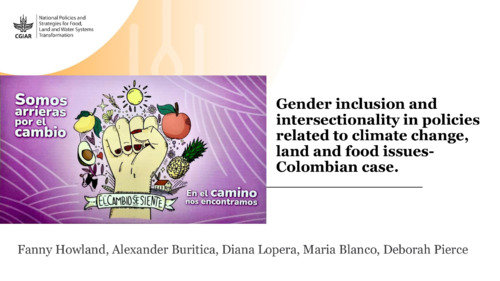Gender inclusion and intersectionality in policies related to climate change, land and food issues - Colombian case
Although progress has been made in promoting gender equality in governments, gender and intersectional inequalities in national agri-food and climate policies are rarely meaningfully considered or systematically addressed. The nexus between climate, agri-food and gender issues is relevant. Climate and gender policies often follow a top-down approach without integrating women’s and men’s knowledge, vulnerabilities and demands; and do not address structural causes of gender and intersectional inequalities. The link between gender and food issues is related to power and control in food systems and related to a set of social, economic and physical conditions. We propose an innovative methodology to assess gender and intersectionality integration in policies based on the concepts of policy integration, policy translation and policy coherence. An intersectional gender lens is crucial, as gender-blind policies often prioritize the needs of men and dominant social groups, neglecting the needs of women and marginalized populations. Through policy-document analysis and informant interviews, we examine how gender and intersectionality are portrayed and integrated in climate and agri-food policies, using as case studies Guatemala, Honduras and Colombia. Results indicate that gender and intersectionality mainstreaming in policies remains limited. Gender translations, policy barriers, lack of knowledge and capacity are some of the barriers identified. Intersectionality is poorly considered and limited to general categories such as ‘rural women’ or to women’s function (‘nutrient provider for malnourished children’). These results provide valuable insights that could inform policymakers.

